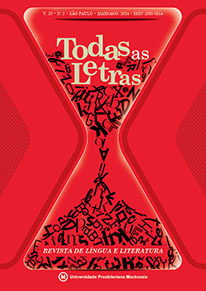“Eu não atendo bêbado”:
ambiguidade, eficiência e gramática
Palavras-chave:
Ambiguidade, Estratégia, Eficiência, Gramática Discursivo-FuncionalResumo
O artigo apresenta uma análise, no quadro da Gramática Discursivo-Funcional, de uma piada e do seu ambiente textual, mostrando como esta revela os papéis da ambiguidade, da eficiência e das estratégias gramaticais na interação humana.
Downloads
Referências
ATTARDO, S. Humor in language. Oxford Research Encyclopedia of Linguistics, 2017. Disponível em: oxfordre.com/linguistics. Acesso em: 2 fev. 2023.
BÜHLER, K. Sprachtheorie: die Darstellungsfunktion der Sprache. Jena: Gustav Fischer, 1924.
CHOMSKY, N. On nature and language. Cambridge: Cambridge University Press, 2001.
FERREIRA, F.; BAILEY, K. G. D.; FERRARO, V. Good-enough representations in language comprehension. Current Directions in Psychological Science, v. 11, n. 1, p. 11-15, 2002.
GIVÓN, T. Syntax. Amsterdam: John Benjamins, 2001. v. II.
GOLDBERG, A.; FERREIRA, F. Good-enough language production. Trends in Cognitive Sciences, v. 26, n. 4, p. 300-311, 2022.
GRICE, H. P. Logic and conversation. In: COLE, P.; MORGAN, J. J. (ed.). Syntax and semantics 3: speech acts. New York: Academic Press, 1975. p. 41-58.
HATTNHER, M. M. D.; OLIVEIRA, T.; CONEGLIAN, A. V. L. (ed.). Linguagem, uso e gramática: da vivência à teorização. São Paulo: Editora Mackenzie, 2022.
HAWKINS, J. A. Efficiency and complexity in grammars. Oxford: Oxford University Press, 2004.
HENGEVELD, K.; MACKENZIE, J. L. Gramática discursivo-funcional. Tradução Marize Dall’Aglio Hattnher. In: SOUSA, E. R. de (ed.). Funcionalismo linguístico: novas tendências teóricas. São Paulo: Contexto, 2012. p. 43-86.
LEVINSON, S. C. Minimization and conversational inference. In: KASHER, A.
(ed.). Pragmatics: vol. 4 Presupposition, implicature and indirect speech acts.
London: Routledge, 1998. p. 545-612.
LEVINSON, S. C. Presumptive meanings: the theory of generalized conversational
implicature. Cambridge, MA: MIT Press, 2000.
LEVSHINA, N. Communicative efficiency: language structure and use. Cambridge: Cambridge University Press, 2022.
ZIPF, George K. Human behavior and the principle of least effort. Boston: Addison-Wesley, 1949.
ZWICKY, Arnold M.; SADOCK, Jerrold M. Ambiguity tests and how to fail them. In: KIMBALL, J. (Ed.), Syntax and Semantics (Volume IV), 1975, p. 1-36. Nova Iorque: Academic Press.
MACKENZIE, J. L. The family of secondary predications in English: an FDG view. Revista Canaria de Estudios Ingleses, n. 67, p. 43-58, 2013.
MACKENZIE, J. L. Why functional discourse grammar is not, and could notbe, a discourse grammar. Revista Canaria de Estudios Ingleses, n. 80, p. 73-87,2020.
NEVES, M. H. de M. A gramática funcional. São Paulo: Martins Fontes, 1997.
NEVES, M. H. de M. A gramática passada a limpo: conceitos, análises e parâmetros.
São Paulo: Parábola, 2012.
NEVES, M. H. de M. Linguística funcional: princípios, temas, objetos e conexões. Guavira Letras, v. 13, p. 23-38, 2011.
NEVES, M. H. de M.; MACKENZIE, J. L.; CONEGLIAN, A. Dossiê temático: descrição funcional das línguas naturais. Revista da Abralin, v. 19, n. 3, p. 17-239,
PIANTADOSI, S. T.; TILY, H.; GIBSON, E. The communicative function of ambiguity in language. Cognition, v. 122, n. 3, p. 280-291, 2012.PLESHAK, P.; POLINSKY, M. Functional typology and formal comparative syntax.
In: DEN DIKKEN, M. (ed.). Cambridge handbook of comparative syntax. Cambridge: Cambridge University Press, 2024. No prelo.
SPERBER, D.; WILSON, D. Relevance: communication and cognition. London:Blackwell, 1986.
WASOW, T. Ambiguity avoidance is overrated. In: WINKLER, S. (ed.). Ambiguity: language and communication. Berlin, Munich, Boston: De Gruyter, 2015. p. 29-48.
WITTGENSTEIN, L. Philosophical investigations. Translation G. E. M. Anscombe. Oxford: Blackwell, 1968.
ZIPF, G. K. Human behavior and the principle of least effort. Boston: Addison-Wesley, 1949.
ZWICKY, A. M.; SADOCK, J. M. Ambiguity tests and how to fail them. In:
KIMBALL, J. (ed.). Syntax and semantics. New York: Academic Press, 1975. v. IV,
p. 1-36.
Downloads
Publicado
Como Citar
Edição
Seção
Licença
Copyright (c) 2024 J. Lachlan Mackenzie

Este trabalho está licenciado sob uma licença Creative Commons Attribution-NonCommercial 4.0 International License.
Os direitos autorais dos artigos publicados na Todas as Letras pertencem aos autores, que concedem à Universidade Presbiteriana Mackenzie os direitos exclusivos de publicação do conteúdo. É vedada sua reprodução total ou parcial sem a devida autorização da Comissão Editorial, exceto para estudo e pesquisa.




